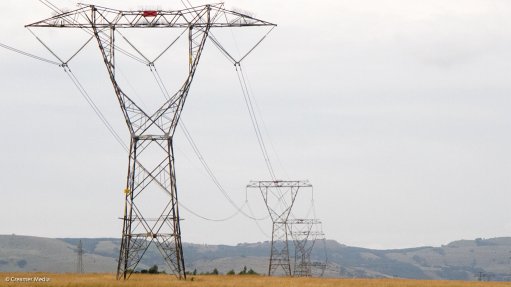
Photo by: Creamer Media
On February 12, Trade, Industry and Competition Minister Ebrahim Patel published a Gazette notice granting the Department of Mineral Resources and Energy (DMRE) permission to deviate from the relevant Broad-Based Black Economic Empowerment code of good practice for the Risk Mitigation Independent Power Producer Procurement Programme (RMIPPPP).
Through the RMIPPPP, government is aiming to procure 2 000 MW of ‘emergency’ power for operation by June 2022. The evaluation of the 28 bids received ahead of the submission deadline, which was extended to December 22 from an initial deadline of November 24, is under way and is expected to be completed this month.
Engineering News Editor Terence Creamer approached the DMRE to understand why it had applied for the deviation and the department’s responses follow below.
Engineering News: Why was it deemed necessary for the DMRE to apply for this deviation from the B-BBEE Codes for the RMIPPPP programme?
DMRE: The Economic Development (ED) Framework for the RMIPPPP is based on a bespoke scorecard that is aligned with the Amended B-BBEE Codes of Good Practice, 2013 and 2019 and Construction Sector Codes 2009. The RMIPPPP ED Framework differs, however, from the Amended B-BBEE Codes of Good Practice, in a number of distinct ways, which required an application for exemption. It is important to note that the B-BBEE Act and relevant sector codes are largely based on historical performance, which is not ideal in the context of IPP projects where special purpose vehicles (SPVs) are set up without a historic track record of compliance with sector codes.
The main differences which necessitates the exemption include:
- The RMIPPPPP ED Framework is based on forward-looking commitments over the lifetime of the project, which bidders make at bid submission, while the Codes of Good Practice assess the conduct of entities retrospectively;
- The RMIPPPP ED Framework adds the key elements of Job Creation and Local Content in order to advance key ingredients for economic and industry development, local participation and technological progress. These elements are currently not included in the Codes of Good Practice;
- The RMIPPPP ED Framework stipulates minimum thresholds whereas the Codes of Good Practice do not. This is a deliberate design to exceed the generic B-BBEE targets in order to optimise benefits for local communities and local industrialisation.
It is critical for all procurement rounds to be aligned with the B-BBEE Act as amended. The B-BBEE Act came into effect in 2014 and the Codes of Good Practice came into effect in 2015, hence it was important to request the deviation on the RMIPPPP Request for Proposal (RFP) or any new RFP.
Could you outline the reasons given to the Trade, Industry and Competition Minister in the letter quoted in the Gazette why the DMRE requested this deviation?
The reasons for the deviation request are outlined in the response to Question 1 above.
From which elements of the codes will successful RMIPPPP bidders now be entitled to deviate?
All sub-elements in the generic B-BBEE scorecard have been catered for and improved on in one way or another. As explained above, the deviations are applied to minimum thresholds and targets in respect of these elements and sub-elements.
Why has specific reference been made to a 10-year operating period when the RMIPPPP bidding documents stipulate 20 years?
It is our understanding that the period of 10 years or shorter, as specified by dtic, is stated in terms of Section 7 (a) of the B-BBEE Regulations of 2016, which provides that the Minister may only grant permission, with or without conditions, for a specified period not exceeding 10 years.
Given the RMIPPPP bid documentation did not accommodate a deviation upfront, does this belated deviation notice not open up the process to legal challenge?
The Request for Proposal (RFP) specifies that the RFP is issued, subject to the exemption being granted.
Does this belated deviation notice not undermine future bidding rounds, as it suggests that bidders can make noncompliant bids in the expectation that they will be made compliant by a later deviation notice?
No, it does not undermine future bid rounds, nor does it affect bid compliance. See response to Question 5.